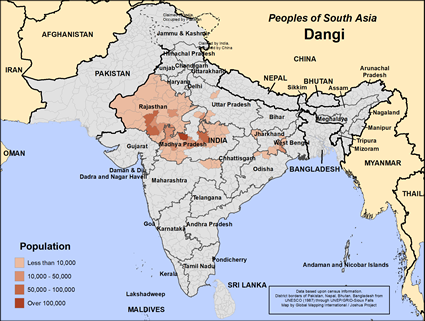The Dangs Bhil live in the rocky, hilly forests of western central India. They are primarily located in the Dangs district of Gujarat State. Dangi, their native language, is the language of trade in this region. Dangi is a sub-group of Khandesi, which belongs to the Indo-Aryan language family.
The Western Chalukya were the first people to establish political control throughout the region. Later, the Rashtrakuta gained control and brought the Dangi under submission to local chiefs, who were mostly Bhil. The forest wealth exploited by the Dangi enticed the Bhil, as well as the British, causing constant conflicts between the groups. Eventually, the Dangi were forced into slavery.
Later, the people who lived on the plains joined forces with the invading tribes. The Dangi, however, granted shelter to those who were ousted from their homes. For years the Dangi remained isolated, living in poor physical conditions. However, in 1947, plans were initiated to improve their circumstances.
The Dangi were originally very poor, having few material possessions and survived by gathering food from the forests. They had no time for intellectual pursuits but sought only to survive. They lived a hard, monotonous life in the mountainous forests, causing them to become individualistic and somewhat introverted. Nevertheless, their love of freedom has made them a people of sturdy character.
Today, the Dangi Bhil continue to live in extreme poverty, and their social lives are built around the search for food. They have always lived close to nature, depending on it for survival. Animals are respected and treated as equals. For this reason, they are often called the "children of nature." The Dangs district contains many protected forests that the Dangi are allowed to use for cultivation and residence. They live in one-room bamboo huts made with thatched roofs.
The family is the basic unit of social and religious life among the Dangi. Their society is patrilineal, meaning that the line of descent is through the males. Young newlyweds typically live near or with the husband's family. Social and religious order is maintained by an institution known as the panch.
Due to the warm, moist climate of the Dangs district, the people wear very little clothing. The women like to wear grass ornaments.
The Dangi enjoy singing and dancing. However, their animated tribal dances are no longer as significant as they once were. The villagers are skilled in creating objects out of stone, wood, and clay. Hindu artisans often help them with such crafts. Tattooing has also become an art among the Dangi.
The majority of the Dangi practice ethnic religions, and all of them are involved in ancestor worship (praying to deceased ancestors). Their lives revolve around rites, rituals and folk beliefs. Many are animists, believing that all objects have spirits. Trees, animals, demons, serpents, and spirits are worshipped through magical rituals. Wagh-Dev, the tiger god, is their sacred animal god and their emblem of worship.
The Dangi believe in magic, witchcraft, and sorcery along with their many tribal gods and Hindu deities. They believe that the supernatural world contains both good and evil. Their constant fear of the spirits keeps them revolving around a circle of prayers, rituals, offerings, and sacrifices. The Bhagat (priest and medicine man) is thought to be the ultimate "good man." He is believed to be a spiritual man who communicates with the gods. He is considered a friend, a philosopher, a guide and a healer.
All such beliefs can be under the umbrella of “Hinduism” so the Dangi are considered Hindu.
More missionaries and humanitarian aid workers are needed to work among the Dangi.
Ask God to raise up prayer teams who will break up the soil through worship and intercession.
Pray the Dangi Bhil be lifted out of poverty.
Pray that the Lord will send forth laborers to live among the Dangi tribes.
Ask God to grant wisdom and favor to missions agencies focusing on the Dangi Bhil.
Ask God to give the Dangi believers boldness to share the Gospel with their own people.
Scripture Prayers for the Dangi in India.
https://en.wikipedia.org/wiki/Dangi_people#:~:text=The%20Dangi%20are%20an%20agricultural%20Hindu%20caste%20native,is%20the%20most%20commonly%20understood%20language%20among%20them.
https://books.google.com/books?id=cLBhAAAAIAAJ
https://books.goo
| Profile Source: Joshua Project |











